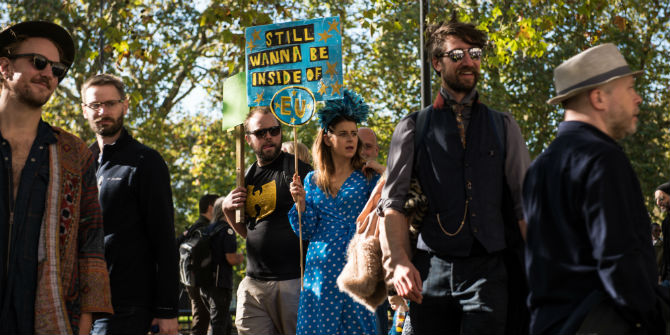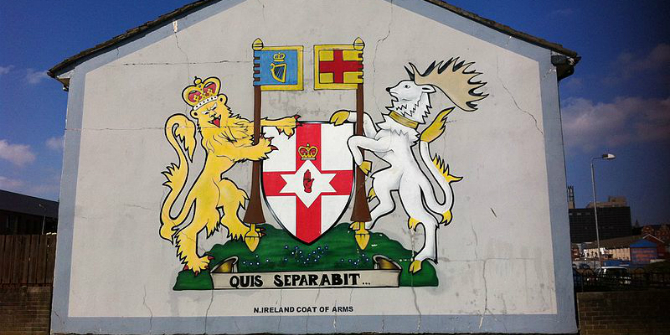 Two decades have passed since there was last a serious consideration of how the UK uses referendums. For this reason, the Constitution Unit established the Independent Commission on Referendums to examine whether and how the way in which referendums are regulated in the UK should be changed. Alan Renwick (University College London) explains its terms of reference.
Two decades have passed since there was last a serious consideration of how the UK uses referendums. For this reason, the Constitution Unit established the Independent Commission on Referendums to examine whether and how the way in which referendums are regulated in the UK should be changed. Alan Renwick (University College London) explains its terms of reference.
Yet, crucially important though referendums are, there has been little concerted thinking of late about how they should be conducted. Two inquiries carried out in the 1990s – by the UCL Constitution Unit’s Nairne Commission and by the Committee on Standards in Public Life – led to the creation of some basic rules, laid down in the Political Parties, Elections and Referendums Act 2000. But these rules were always incomplete: for example, they say nothing about who is entitled to vote in a referendum. They are also now two decades old. Much has changed in the intervening years – not least through the rise of the internet and social media. Four major referendums have also been held in that period – on Welsh devolution (2011), the Westminster voting system (2011), Scottish independence (2014), and EU membership (2016) – from which lessons can be learned. Many observers have been dismayed by the conduct of those referendums, whether they agreed with the results or not. A careful review of whether we could do better is therefore overdue.

That is the task of the Independent Commission on Referendums, established by the Constitution Unit last autumn to examine the role and conduct of referendums in the UK and consider what changes might be desirable. Comprising twelve eminent individuals with diverse perspectives on referendums, including current and former parliamentarians, journalists, regulators, and academics, the Commission is due to report this summer. It is keen to hear as many views as possible, it is holding seminars in all of the UK’s capital cities. The Edinburgh seminar is the next in this series, co-hosted with the Royal Society of Edinburgh next Monday.
The questions being considered by the Commission include the following:
• What role should referendums play in democracy in the UK? Should they be held more or less frequently than they are at present, or do we have the balance about right? On what sorts of issues are referendums desirable or even necessary? Are there issues on which referendums ought not to be held?
• How should referendums fit into the wider decision-making process? Should referendums come at the start of the process – on a broad principle the detail of which is yet to be worked out – or only at the end – on a precise proposal that has already been written up in law? If referendums of the former type are sometimes needed, what can be done to give voters clarity on what the options mean? What should happen if voters support change, but the outcome that is delivered is very different from what was promised?
• What can be done to ensure that the referendum campaign is fair between competing perspectives? Should the bar on using public funds to support one side of the debate – which currently applies only in the final four weeks before a vote – be extended to the whole campaign period? Do rules on campaign funding and expenditure adequately ensure a level playing field?
• Should any changes be made to help voters find the information that they want from sources that they trust? Would it be advisable to seek to ban false or misleading statements by campaigners, as some have suggested? Should neutral public information materials be provided? Are there ways to bring public deliberation into referendum processes, so that voters get a chance to hear and think through the arguments in depth?
• How should the rules around referendums be adapted to fit the age of social media? Should the regulation of content on Facebook and other providers be strengthened? Can the rules around online advertising be enhanced to prevent hidden ‘microtargeting’ of voters? Is it possible to protect the integrity of referendum processes against the interventions of malign international actors?
• How should the outcome of a referendum be determined? Should a simple majority of voters always be sufficient to determine the result, irrespective of the size of that majority or the level of turnout? Or should there sometimes be higher thresholds, so that historic changes can be made only when it is clear they reflect – to use a phrase from Scottish politics in the 1990s – the voters’ ‘settled will’?
The Independent Commission on Referendums has not yet finally determined its answers to any of these questions. But it has some emerging ideas. We are keen to share these with audience members at the seminar next week and to explore what people make of them. We look forward to a lively discussion.
This post originally appeared on the blog of the Centre on Constitutional Change and is reposted with permission. It represents the views of the author and not those of the Brexit blog, nor the LSE.
Alan Renwick is the Research Director for the Independent Commission on Referendums and Deputy Director of the Constitution Unit.







Most certainly agree on point 4, but its not enough for voters merely to glance at that information; voters must have their competency assessed too.
We already have a system familiar to the public that does just this – it’s called the Driver’s Theory Test and it’s been a hugely successful. While some might begrudge having to take it, the Driver’s Theory Test has helped to improve driver standards and made our roads much safer as a result.
If we could apply the same principles to democracy, then by the same token we could improve the running of our country too, making us less prone to accidents. How odd that drivers are better qualified to drive their cars than they are to steer the nation!
Competency Based Voting (‘Meritvote’).
https://www.youtube.com/watch?v=fY2gE_8oYd8
But there’s another reason why we should seek to seek to ban false or misleading statements by campaigners. During the referendum campaign, the vote was swayed by demagoguery and by grotesque conduct by certain sections of the media. Just imagine if, by analogy, the Highway Code, instead of being produced by one single authority – The Stationary Office – could instead be written by any Nigel, Boris or Michael? Our roads would soon become very dangerous places indeed.
If voters knew that their own personal influence in the vote was proportional their understanding of the officially published information, they would focus their attention on that information and take other sources with a pinch of salt in order to achieve the highest possible test score.
Whether a referendum should be determined by a simple majority depends on circumstances.
In the case of the recent referendum we need to look back at how the status quo was achieved. The public were denied the right to vote on the Maastricht Treaty. The final bill in Parliament was pushed through by John Major only on the second vote. There was a majority against on the first vote.
Under these circumstances the status quo had little claim to legitimacy and was right that the outcome was based upon a simple majority.
There is much controversy surrounding the outcome of the recent referendum. This controversy could be avoided in future if voting was made compulsory as happens in many countries.
I think that the questions raised about trustworthy information are highly relevant considering the bulk of information that reaches voters and the risk of ‘fake news’. What might be interesting here, is the role of lobbying groups, i.e. business groups, firms, NGOs, research communities, etc. Although lobbying groups are often portrayed as anti-democratic, I think they have an important role in referendums.
In an earlier blog post (please see: https://blogs.lse.ac.uk/brexit/2018/01/12/the-usual-underdogs-of-lobbying-were-the-surprising-winners-of-the-brexit-vote-debate/ ), I wrote about the role of these groups during the campaigns of the Brexit-referendum. What I found was that neutral actors, like research communities and think-tanks, were highly successful in producing media-output. Looking at the produced articles, one sees that these groups deliberate and discuss the pro’s and con’s of a potential Brexit, and let the reader decide what should be the ‘right’ vote. My analysis shows that journalists highly valued these types of objective and neutral information above information that was biased to one side of the debate.
This finding is remarkable since one would expect that extremely resourceful ‘big business’ groups would be more influential in the debate. Also, it shows that neutral and objective information might come from an unexpected side of society. Therefore, it would be valuable to discuss how governments can stimulate particular lobbying groups to get involved in referendums.
The questions raised about the trustworthiness of information in referendum campaigns are highly relevant in the age of ‘fake news’. Voters are exposed to all types of information and have to decide themselves which news can be trusted. However, there might be an important role for lobbying groups, i.e. business groups, firms, NGOs, research groups etc. Although lobbying groups are often portrayed as anti-democratic, I think they could help to provide voters with neutral and objective information.
In a recent blog post (please see: https://blogs.lse.ac.uk/brexit/2018/01/12/the-usual-underdogs-of-lobbying-were-the-surprising-winners-of-the-brexit-vote-debate/ ), I showed that neutral groups, like research groups and think-tanks were highly successful in getting their message across during the Brexit-referendum campaigns. These groups deliberated and discussed various arguments in favour and against a potential Brexit, and let the reader decide what should be the ‘right’ vote. Journalists valued this neutral and objective message more than the biased information of, for example, ‘big business’ groups.
This finding is remarkable, since we would expect that these extremely resourceful groups would be more successful in getting their biased information in the media. Therefore, it would be interesting to discuss how governments can activate and stimulate particular lobbying groups to get involved in referendums, and provide objective and trustworthy information to the voters.
The four referendums mentioned in this article all pitted a major change of constitutional direction of either one nation of the UK or the whole UK against the status quo. Under such circumstances, emotions for both sides run high, and lies and misinformation is rife. Social media only exacerbates this problem. It is virtually impossible to control claims for either side, and social media internet content cannot really be policed.
Under such circumstances, it can only be right for a society to embark on a huge change, such as independence for Scotland, change of voting system or leaving the EU, with a settled majority in favour. There are various formula, but a simple majority of those who vote cannot really settle issues – witness the EU or Scottish independence referendums.
Some of the solutions include a super majority, a majority of those eligible to vote, mandatory voting or others or combinations of those. The government has a formula for allowing strikes in essential services which goes beyond a simple majority of those who voted, so the concept already exists in UK law.
When a major purchase commitment is made, often there is by law a cooling off period in which the purchaser is allowed to change his or her mind without penalty. Perhaps, there should be the same with referendums such as those mentioned – that is a second referendum when the true consequences of a decision may be seen.
Of course, in votes for the status quo like in Scotland and the change in the voting system, would such a cooling off period would be necessary as nothing will have changed? but is this fair?
All in all, referendums are a minefield, as Scotland and the EU have shown. One thing for sure, is that the current system is not adequate to accurately judge the will of the people and the UK should not go down this road again without properly scrutinising the process.
Switzerland uses initiatives and referendums regularly. There are some strict rules which might be adapted for this country. I am sure there are other countries that one could consult rather than the UK view that we have to invent everything ourselves and will of course therefore do it better.
But I do not think that a first past the post system lends itself to a system of initiatives and referendums as it does not offer any real choices in the end. A good example is the recent election.
By the way: a referendum should be triggered by the people, not the politicians / government.